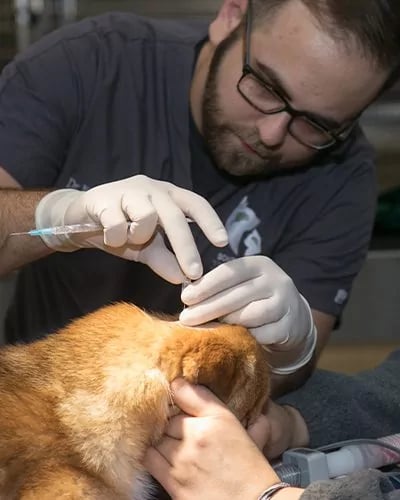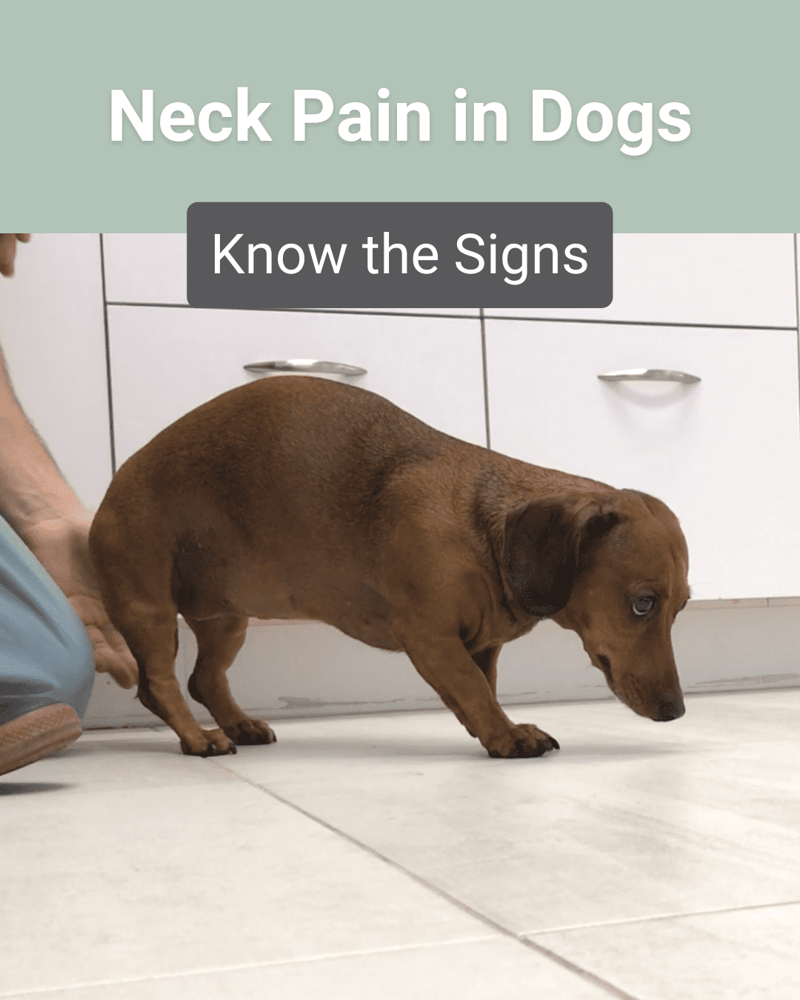Cervical Disc Disease in Dogs
Home » Conditions We Treat » Cervical Disc Disease
What is cervical disc disease?
Cervical disc disease in dogs is a condition in which one of the discs between the vertebrae in your pet’s neck becomes damaged and ruptures. It is similar to thoracolumbar (back) IVDD, except it occurs only in the cervical spine (neck). In other words, cervical disc disease is a slipped disc in the neck.
A cervical disc rupture occurs when the jelly-like inner part of the disc pushes through the fibrous outer layer. Consequently, this compresses the spinal cord, causing pain or difficulty walking in all four limbs.
While any dog (and even cats) can be affected, it is most common in Dachshunds, French Bulldogs, Beagles, and Poodles. In order to properly diagnose cervical disc disease in your pet, visit a neurology specialist at Southeast Veterinary Neurology (SEVN) for a detailed neurological exam.
We're leaders in veterinary neurology.
If your pet is experiencing neck pain, our team can help.
Signs of Cervical Disc Disease in Pets
Neck pain is the most common symptom associated with problems in the spinal cord of the neck. However, just like in IVDD of the back, clinical signs of cervical disease are graded on a scale of 1-5.
- Able to walk normally
- Exhibiting signs of neck pain* such as not wanting to jump or move, walking slowly or gingerly, crying, shivering, neck muscle spasms, shivering, or holding the head low
*Neck pain is the most common clinical sign of cervical disc disease in dogs.
- Still able to walk, but weak and wobbly in all four limbs
- May cross, splay out, or stumble over all four legs or walk with all four paws knuckled under
- Too weak in all four limbs to stand or walk
- Still able to move limbs and wag tail
- Cannot stand or walk
- Cannot move all four limbs
- Still able to feel toes
- Cannot stand or walk
- Cannot move all four limbs
- Cannot feel all four limbs
*This is uncommon with cervical disc disease, but extremely serious.

How We Diagnose Cervical Disc Disease in Dogs

There are many different conditions that can potentially be the cause of your pet's neck pain including:
- Atlantoaxial (AA) instability
- Meningitis
- Discospondylitis
- Tumor
- Syringomyelia (SM)
- “Wobbler’s” disease
Since other conditions can present with neck pain, we will need to perform some diagnostic tests to correctly identify your pet’s condition.
- First, a complete blood count (CBC), chemistry panel (lab work), and chest X-rays are needed to evaluate your pet’s health.
- Second, high-field MRI is the best imaging tool for viewing your pet’s nervous system and detecting a slipped or ruptured disc, as well as other causes of neck pain.
- Lastly, our team might suggest a CSF analysis.
Treatment of Cervical Disc Disease in Pets
There are two basic ways to treat a dog with a slipped disc in the neck. The course we recommend depends on how serious the symptoms are, how long they have been going on, and the likelihood of the problem actually being a slipped disc.
The first approach involves pain relief medications and strict rest. This option is best for breeds that:
- Commonly get slipped discs
- Are still able to walk
- Are experiencing neck pain for the first time
- Have been having symptoms for just a short time
The second approach involves tests to confirm the symptoms are due to a slipped disc, which disc is affected, and if surgery will be necessary. MRI and surgery should be considered for dogs that:
- Do not commonly get slipped discs
- Have a wobbly walk or cannot walk at all
- Get better but then get worse again
While certain cases may improve with medications and strict crate rest, the prognosis for most dogs that have a slipped disc in the neck is excellent with surgery. Surgical decompression with one of the qualified neurosurgeons at SEVN has about a 98% chance of being curative.
